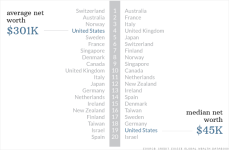SimpleDon
Veteran Member
Wealth inequality is not the "natural" result of capitalism, it is the result of fiscal policies of the individual countries. The US has terrible wealth (and income) inequality because our fiscal policies are designed to produce inequality.
A single chart from here demonstrates this.
The US has the 4th highest average wealth among the 20 capitalist democracies on the chart. And the 19th overall median wealth, half have more, half have less. This difference indicates a high level of wealth inequality in the US compared to all of the other countries.
It means that the wealth inequality isn't a result of structural changes in capitalism, because of globalization, because of increasing application of automation, because of failing schools, because of the increased value of education, etc. It is because we in the US chose to adopt fiscal policies meant to produce inequality. We chose to increase the income and the wealth of the rich at the cost of everyone else.
A single chart from here demonstrates this.
The US has the 4th highest average wealth among the 20 capitalist democracies on the chart. And the 19th overall median wealth, half have more, half have less. This difference indicates a high level of wealth inequality in the US compared to all of the other countries.
It means that the wealth inequality isn't a result of structural changes in capitalism, because of globalization, because of increasing application of automation, because of failing schools, because of the increased value of education, etc. It is because we in the US chose to adopt fiscal policies meant to produce inequality. We chose to increase the income and the wealth of the rich at the cost of everyone else.

